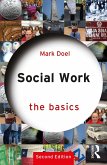Dieser Download kann aus rechtlichen Gründen nur mit Rechnungsadresse in A, B, BG, CY, CZ, D, DK, EW, E, FIN, F, GR, HR, H, IRL, I, LT, L, LR, M, NL, PL, P, R, S, SLO, SK ausgeliefert werden.
Hinweis: Dieser Artikel kann nur an eine deutsche Lieferadresse ausgeliefert werden.
'[T]he author provides useful..."learning activities and lessons" at the end of each chapter.[T]his book provides a useful framework for teaching and learning about aspects of theorising that are transparent
and potentially open to critical reflection. The framework provided is valid as an approach to making meaning of complex life situations and applying that understanding to social work practice in Australia.'
Deborah Hart, University of Newcastle, Australia, Australian Social Work,









